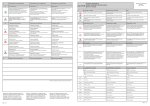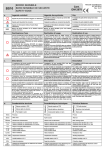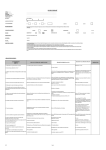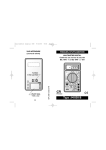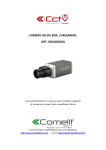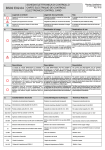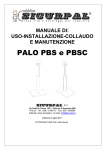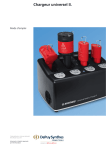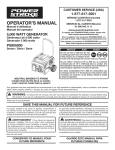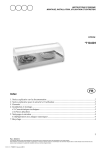Download Cert. EN12978
Transcript
BSD MBS b. Cert. EN12978 Key Segnala le parti del manuale da leggere con attenzione Il signale les parties du manuel qui doivent être lues soigneusement It indicates the parts of the manual to be read carefully; Segnala parti riguardanti la sicurezza Il signale les parties qui concernent la sécurité; It indicates the parts related to safety; Segnala le informazioni dirette all’ utente finale (utilizzatore) Misura del Bordo Sensibile che si desidera ottenere (calotte comprese) Il signale les informations adressées à l’usager final (utilisateur) Mesure du Bord Sensible qu’on veut obtenir (couvercle compris) It indicates the information aimed to the final user (consumer) Destinazione d’uso Destination d’usage Destination of use Le bord sensible BSD est utilisé comme un dispositif de sécurité dans des systèmes d’automatisation pour portails coulissantes et à battente, contre les risques de concassage et de piégeage. La déformation du caoutchouc provoque l’intervention du bord sensible sur toute sa hauteur. La conformité à la norme EN12978 de le bord sensible BSD est soumis à des tests de contrôle de l’unité de commande. Utilisations du bord sensible BSD différentes de ce Utilizzi diversi da quanto sopra descritto del bordo senqui a été ci-dessus décrit ou installations pas exésibile BSD o installazione non eseguita in conformità a cutées en conformité avec ce qui est décrit dans ce quanto descritto nel seguente manuale possono pregiumanuel peuvent compromettre le correct fonctiondicare il corretto funzionamento del dispositivo. nement du dispositif. Destinazione d’uso Destination d’usage Safety Edge size you wish to obtain (cap included) The safety edge BSD is used as a safety device for automation sistems for sliding and swinging gates, as protection against risks of crushing and trapping. The deformation of the rubber causes the intervention of the safety edge along its entire height. Compliance to EN12978 rules of the edge sensitive BSD is subject to the Control Testing by the control unit. Uses of BSD safety edge which are different from what above mentioned or installations which are not realized according to what described in this manual can compromise the right working of the device. Destination of use L’ installazione del bordo sensibile BSD dovrà essere L’installation du bord sensible BSD doit être exécueseguita da installatori qualificati. tée par installateurs qualifiés. Le bord sensible ne nécessite pas d’opérations Il bordo sensibile non necessita di particolari operazioni spéciales de réinitialisation/remise à exécuter en di riarmo/riavvio da eseguire in seguito ad un’allarme del réponse à un alarme dans le dispositif, parce que dispositivo, inquanto il ripristino avviene automaticamenla récupération s’effectue automatiquement. Pour te. Per i guasti in cui permane l’allarme del dispositivo, les défauts qui maintient le dispositif en alarme, fare riferimento alla tabella g.2 “risoluzione dei problemi”. reportez-vous au tableau g.2 «dépannage». L’installatore deve far conoscere all’utente finale i dispo- L’installateur doit faire connaître à l’utilisateur final sitivi di sicurezza e le loro caratteristiche ed istruirlo in les dispositifs de sécurité et leurs caractéristiques modo tale che le aree che danno accesso ai dispositivi et lui informer que les zones qui donnent accès au del sistema vengano mantenute libere da ostacoli. système soyent maintenus libres de tout obstacle. ll bordo sensibile BSD va posizionato in sede verticale Le bord BSD doit être placé à la verticale, en preavendo cura di montare la scheda con i microswitches nant soin de monter la carte avec les micros dans nella parte superiore. la partie supérieure. Il bordo sensibile BSD è formato da un’ estruso in gom- Le bord BSD est formé par un caoutchouc extrudé ma con dopocorsa elastico di ammortamento urto, e da avec après-course d’amortissement de choc élasun profilo in alluminio che, fissato alla colonna o al can- tique et par un profilé en aluminium qui est fixé cello, funge da supporto all’ estruso. à la colonne ou à la grille et qui agit comme un Il funzionamento del dispositivo è garantito da 2 mi- support. Le fonctionnement du dispositif est garanti croswitches. Entrambi lavorano su deformazione della par 2 micro-interrupteurs. Les deux travaillent sur costa comprensiva delle calotte morbide poste alle estre- la déformation de la barre y compris les capuchons mità e come sicurezza nel caso in cui il cavo di acciaio souples aux extrémités et comme sécurité dans le dovesse perdere tensione. cas où le câble d’acier perd sa tension. The installation of BSD safety edge must be realized by qualified fitters. Caratteristiche tecniche Technical features Estruso morbido in TPE Estruso rigido in alluminio Parti rigide in nylon Caractéristiques techniques Matériels Materiali c. Extrudé souple en TPE Extrudé rigide en aluminium Composants rigides en nylon The safety edge requires no special operations reset/ restart to execute in response to an alarm device, as recovery takes place automatically. For faults which keeps the device alarm, please refer to the table g.2 “troubleshooting”. The fitter must introduce the end user to the safety devices and their characteristics and inform him so that the areas that give access to the system devices must be kept free of obstacles. BSD Sensitive edge must be positioned in the vertical, taking care to mount the card with the microswitches in the upper part. The safety edge BSD is composed by an extruded rubber with elastic after-run of amortization and an aluminum profile that is fixed to the column or to the gate and it acts as a support. The operation of the device is guaranteed by 2 microswitches. Both work on deformation of the edge including soft caps at the ends if the steel cable lose tension. TPE soft extruded Aluminium hard extruded Nylon parts 18mm Precorsa Pré-course Pre-run 24mm Oltre corsa Aprés-course After-run 12m/min Velocità max di rilevamento Vitesse max de relévement Max. bearing speed >0.15 s >2 s Tempo di risposta con avanzamento 12 m/min Tempo di risposta con avanzamento a 0.6 m/min Temps de réponse avec avancement à 12 m/min Temps de réponse avec avancement à 0,6 m/min Response time with feed 12 m / min Response time with feed 0.6 m / min <2s Tempo di recupero deformazione Temps de recouvrement Distorsion recovery time J1 NC J1 R Uscita contatto NC Uscita contatto resistivo Sortie contact NC Sortie contact résistif NC Contact output Resistive Contact output 8,2 KΩ Valore resistenza Valeur résistance Resistance value Température d’exercise Working temperature -10°C / +60°C Temperatura d’esercizio 93% Umidità relativa a 40° C Humidité relative à 40° C Relative humidity at 40° C IP54 Grado di protezione Degré de protection Protection degree Categoria di appartenenza con elettronica di controllo Catégorie d’appartenance avec électronique de Category of belonging with electronic control contrôle 2/3 EN954-1 Pag.1 Légende des symboles Il bordo sensibile BSD viene utilizzato come dispositivo di sicurezza su impianti di automazione per cancelli a scorrimento orizzontale e ad anta, a protezione di rischi di schiacciamento ed intrappolamento. La deformazione della gomma provoca l’intervento del bordo sensibile lungo tutta la sua altezza. La conformità alla normativa EN12978 del bordo sensibile BSD è subordinata al Test di Controllo da parte della centrale di comando. c. Manuale di Installazione D-MNL0BSD Rev. 14-01 Legenda e simboli Materials a. BORDO SENSIBILE BORD SENSIBLE DE SECURITE SAFETY EDGE e. Montaggio Bordo Sensibile Montage du Bord Sensible Safety Edge installation L’installazione del Bordo Sensibile BSD dovrà essere L’installation du Bord Sensible BSD doit être exé- The installation of BSD Safety Edge must be realized eseguito da installatori qualificati cutée par installateurs qualifiée. by qualified fitters. ATTENZIONE: Apportare modifiche al sistema e/o alla ATTENTION: Apporter des modifications au sys- WARNING: Make changes to the system and/ or its sua configurazione non autorizzate dal fabbricante pos- tème et/ou à sa configuration pas autorisés par le configuration not authorized by the manufacturer sono causare situazioni pericolose. fabricant peut causer des situations dangereuses. may cause dangerous situations. e.1 Fissaggio della costa e.1.1 e.1.2 e.1.3 e.2 e.3 e.4 MBS Misura Bordo Sensibile Dimension du Bord Sensible Safety edge size TAB. 1 Fixage de la barre Fixing of the safety edge Per modificare l’altezza del bordo sensibile vedere le Pour changer la hauteur du bord sensible suivre To change the height of the edge sensitive follow the istruzioni riportate al punto “ f “. les instructions données dans « f ». instructions given in “ f “. Fissare le CLIP (DIS.1 part.1) alla colonna o al cancello facendo riferimento alle quote riportare nella TAB 1 (H1.1 / H 1.2 / H 1.3) Inserire la costa nelle CLIP e fissarla alla colonna o al cancello con i fori predisposti (DIS.1 part.2), vedi TAB 1 (H 2.1 / H 2.2) Fix the CLIP (DIS.1 part.1) to the column or to the Fixer le CLIP (DIS.1 part.1) à la colonne ou à la gate by reference to the shares back in TAB 1 (H1.1 grille en se référant à la TAB 1 (H1.1 / H 1,2 / H 1,3) / H 1.2 / H 1.3) Entrez la barre dans les CLIPS et fixez-la par les Fit the edge to the CLIP in the column or in the gate trous à la colonne ou à la grille (DIS.1 part.2), voir and secure with holes (DIS.1 part.2), see TAB 1 (H TAB 1 (H 2.1 / H 2.2) 2.1 / H 2.2) Collegamento Connexion Connection - Une fois assemblé le bord à la colonne ou à la - Montato il Bordo Sensibile alla colonna o al cancello grille, effectuer les liens du bord selon le schéma eseguire i collegamenti della costa secondo lo schema ci-joint (DIS.2 part.1). allegato (DIS.2 part.1) - Le jumper J1 sélectionne le type de contact que - Il jumper J1 seleziona il tipo di contatto che si vuole vous souhaitez utiliser avec les bornes de raccorutilizzare sui morsetti di collegamento: dement: J1 NC = Contatto NC (DIS.2 part.2) J1 NC= Contact NC (DIS.2 part.2) J1 R = Contatto resistivo 8,2 KΩ (DIS.2 part.3) J1 R = Contact résistif 8.2KΩ (DIS.2 part.3) - Once you have fix the safety edge to the coloumn or to the gate, make connections to the edge, according to the attached diagram (DIS.2 part.1) - The jumper J1 selects the type of contact that you want to use the connection terminals: J1 NC= NC contact (DIS.2 part.2) J1 R = Contact resistance 8,2KΩ (DIS.2 part.3) Tensionatura cavo e taratura Tension du câble et tarage Cable tension and calibration La costa viene già fornita con una pretensionatura del cavo. E’ tuttavia possibile eseguire una ulteriore regolazione della costa agendo sulla VITE (DIS.3 part.1) posta sul braccio del supporto superiore della costa. Ruotando in senso orario si aumenterà la sensibilità della costa (+) Ruotando in senso antiorario si diminuirà la sensibilità della costa (-). Il funzionamento ottimale del dispositivo si ottiene con l’intervento elettrico dello stesso con una deformazione al centro del bordo sensibile pari a circa 20 mm (DIS.4) La barre est déjà fournie avec le câble prétensioné. Cependant il est possible effectuer un ajustement de la barre en tournant la VIS (DIS.3 part.1) placée sur le bras de la partie supérieure de la barre. En tournant vers la droite la sensibilité de la barre va augmenter (+) Tournant vers la gauche la sensibilité de la barre va diminuer (-) Le fonctionnement optimal du dispositif est réalisé à l’intervention électrique de la même avec une déformation au centre de la barre égale à environ 20 mm (DIS.4) The safety edge is already provided with the pretensioned cable. However, you can make further adjustment by turning the SCREW (DIS.3 part .1) on the arm of the upper support of the edge. Turning clockwise will increase the sensitivity the coast (+) Turning counterclockwise will decrease the sensitivity the coast (-) Optimum operation of the device is achieved with the electrical intervention with a deformation at the center of the safety edge equal to about 20 mm (DIS.4) Inserimento delle calotte Encastrement des capuchons Positioning of the cap - Per inserire la calotta morbida, posizionarla frontalmente alla piastra di supporto, avendo cura di fare scorrere le alette terminali nelle proprie sedi di contenimento (DIS.5 part.1) e i due ganci laterali di bloccaggio all’interno delle feritoie predisposte (DIS.5 part.2). Applicare una leggera pressione affinchè vi sia uno scatto ad indicare il corretto collocamento della stessa. - Fissare la calotta con la vite in dotazione (DIS.5 part.3). - Per rimuovere la calotta agire in maniera inversa: togliere la vite di testa (DIS.5 part.3), sganciare la calotta inserendo un utensile all’interno delle feritorie spingendo i ganci verso l’interno. - Pour encastrer le capuchon souple, le placer en face de la plaque de support, en prenant soin de - To insert the soft cap, place it in front of the support faire glisser les extrémités libres dans leur sièges plate, taking care to slide the flaps in their seats (DIS.5 part.1) et les deux crochets latérals de (DIS.5 part.1) and the two lateral locking hooks blocage à l’intérieur des fentes disposées (DIS.5 inside of slits arranged (DIS.5 part.2). Apply light part.2). Appliquez une légère pression pour qu’il pressure so that there is a click to indicate the cory ait un déclic pour indiquer le positionnement rect placement of the same. correct du capuchon. - Secure the cover with the screw provided (DIS.5 - Fixez le capuchon avec la vis fournie (DIS.5 part.3). part.3). - To remove the cover please act in reverse: remove - Pour retirer le capuchon agir en sens inverse: the screw (DIS.5 part.3), release the cap by insertenlever la vis (DIS.5 part.3), relâchez le capuing a tool inside the slits pushing the hooks inward. chon en insérant un outil à l’intérieur des fentes en poussant les crochets vers l’intérieur. Nota Note Allo scopo di migliorare lo scarico di eventuali sedimenti che potrebbero formarsi all’interno della calotta inferiore è consigliabile praticare un foro come indicato nel DIS.5 (part.4). Afin d’améliorer l’évacuation de tout sédiment pouIn order to improve the discharge of any sediment vant se former à l’intérieur du capuchon inférieur il that may find inside the bottom cap, it is advisable to est conseillé de percer un trou comme il est indiqué drill a hole as shown in DIS.5 ( part.4). ci-après en DIS.5 (part.4). Quote fissaggio Bordo Sensibile Niveaux de fixation du Bord Sensible Note Altezza foro fiss. CLIP (mm) Hauteur trou fixation CLIP(mm) Height of the fixing hole for CLIP (mm) H 1.1 1000 mm H 1.2 Altezza foro fiss. SUPPORTI (mm) Hauteur trou fixation SUPPORTS (mm) Height of the fixing hole for SUPPORTS (mm) H 2.1 500 1.500 mm H 2.2 978 1300 1.700 mm 2.000 mm H 1.3 Safety Edge fastening figures 1478 1500 1678 1000 1800 1250 2300 2478 3.000 mm 1500 2800 2978 4.000 mm 2000 3800 3978 2.500 mm 200 22 1978 Pag.2 DIS. 1 DIS. 3 + - PART.2 PART.1 PART.1 PART.1 DIS. 4 PART.1 20 mm DIS. 5 PART.2 PART.1 DIS. 2 PART.1 PART.2 PART.2 J1=NC PART.3 J1=8.2KΩ INGRESSO CAVI ENTREE CABLES CABLE ENTRY PART.3 PART.4 Ø5mm Pag.3 f. Modificare altezza bordo sensibile Changer la hauteur du bord sensible Change the safety edge size f.1 Smontaggio del bordo sensibile Démontage du Bord Sensible - Insérez l’arrêt de rotation fourni et bloquez le - Inserire il fermo di rotazione fornito in dotazione e mouvement de la came (DIS.6 part. 1) bloccare il movimento della camma di attivazione mi- Dévissez la goupille de verrouillage (DIS. 6 part. croswitch (DIS. 6 part. 1) 2) qui bloque le câble provenant de la partie infé- Allentare il grano del giunto (DIS. 6 part. 2) che serra il rieure de la barre. cavo proveniente dalla parte inferiore della costa. - ATTENTION: Ne desserrez pas la goupille - ATTENZIONE: Non allentare il grano del giunto che de verrouillage qui bloque le câble de la came serra il cavo proveniente dalla camma (DIS.6 part.3) (DIS.6 Sfilare il cavo dal giunto fino al supporto inferiore della Débranchez le câble du raccord jusqu’au support costa ( DIS. 7 part.1). inférieur de la barre (DIS. 7 part.1). Togliere il supporto superiore dal profilo in alluminio (DIS. Enlever le support supérieur du profil d’aluminium 7 part.2) (DIS. 7 part.2) Sfilare completamente l’estruso in gomma dal profilo di Retirer completement le caoutchouc de l’alumialluminio ( DIS. 7 part.3) nium (DIS. 7 part.3) f.2 Modifica altezza Modification de la longueur Safety Edge disassembly - Insert the supplied stop position and block the movement of the cam (DIS. 6 part. 1) - Unscrew the locking pin (DIS. 6 part. 2) that locks the cable coming out from the lower part of the edge. - CAUTION: Do not loosen the locking pin that locks the cable from the cam (DIS.6 part.3) Remove the cable from the joint to the lower support of the edge (DIS. 7 part.1). Remove the upper support from the aluminum profile ( DIS. 7 part.2) Withdraw the rubber from aluminum bar (DIS. 7 part.3) Size changing Tagliare l’estruso in alluminio ed il profilo in gomma della Couper l’aluminium et le caoutchouc de la même stessa misura per ottenere l’altezza desiderata. taille pour obtenir la hauteur souhaitée. Il bordo in gomma deve risultare 40mm più lungo del Le bord en caoutchouc doit être de 40 mm plus profilo in alluminio. long que le profilé en aluminium. Cut the extruded aluminum and the rubber in the same size to get the desired height. The rubber edge should be 40mm longer than the aluminum profile. ES. - Per ottenere una costa da ES. - To get a edge of MBS = 1800 mm Estruso in gomma = MBS mm - 245 mm = 1555 mm Profilo in alluminio = MBS mm - 285 mm = 1515 mm ES. - Pour obtenir un bord à MBS = 1800 mm MBS = 1800 mm Extrudés caoutchouc = MBS mm - 245 mm = 1555mm Extruded Rubber = MBS mm - 245 mm = 1555 mm Profilé aluminium = MBS mm - 285 mm = 1515 mm Aluminum profile = MBS mm - 285 mm = 1515 mm DIS. 6 DIS. 7 PART.2 PART.1 PART.3 PART.2 PART.3 PART.1 Pag.4 f.3 Montaggio del bordo sensibile Montage du Bord Sensible Safety Edge installation Improfilare l’estruso in gomma nel profilo di alluminio (DIS. 8 part.1). Ad operazione conclusa il bordo in gomma dovrebbe debordare di 20mm rispetto al profilo in alluminio (DIS. 9 part.1) Riassemblare il supporto superiore nel profilo in alluminio (DIS. 9 part .2) Faites glisser le caoutchouc dans l’aluminium (DIS. 8 part.1). Lorsque vous avez terminé le bord en caoutchouc devrait déborder sur 20mm par rapport au profil d’aluminium (DIS.9 part.1) Remonter le support supérieur sur le profilé d’aluminium (DIS.9 part.2) Slide the rubber in the aluminum profile (DIS. 8 part.1). When you have finished the rubber edge should spill over 20mm compared to the aluminum profile (DIS. 9 part.1) Reassemble the upper support in the aluminum profile (DIS.9 part .2) - Riassemblare il cavo facendolo scorrere attraverso il - Remonter le câble en acier à travers la conduit - Reassemble the steel cable through the cable concavidotto presente nel bordo in gomma (DIS. 9 part.3) logé dans le bord en caoutchouc (DIS. 9 part.3) duit housed in the rubber edge (DIS.9 part.3) - Inserire il cavo nel giunto (DIS. 9 part.4) facendolo - Branchez le câble dans le raccord (DIS. 9 part.4) - Plug the cable into the joint (DIS. 9 part.4) by taking uscire dal foro obliquo di passaggio. en le sortant par le trou oblique. it out of the oblique hole. - En maintenant la tension sur le câble en acier, - Mantenendo in tensione il cavo in acciaio, serrare il - Keeping tension on the steel cable, clamp the loserrez la goupille de verrouillage dans raccord grano di blocco presente nel giunto (DIS.10 part.2) cking pin in this joint (DIS.10 part.2) (DIS.10 part.2) - Rimuovere il fermo di rotazione (DIS. 10 part.1) - Retirer l’arrêt de rotation (DIS. 10 part.1) - Remove the rotation latch (DIS. 10 part.1) - Procedere al «Collegamento» della costa come al p.to - Proceed to the Connection « » of the edge in accor- Procéder à la «Connexion» de la barre selon “e.2” Pag.2 ding to “e.2” Pag.2 “e.2” Pag.2 - Procedere alla «Tensionatura cavo e taratura» come al - Proceed to «Cable tension and calibration» in ac- Procéder à la «Tension du cable et tarage» selon p.to “e.3” Pag.2 cording to”e.3” Pag.2 “e.3” Pag.2 - Procedere all’«Inserimento delle calotte» come al p.to - Proceed to «Positioning of the cap» in according to - Procéder à l’ «Encastrement des capuchons» “e.4” Pag.2 “e.4” Pag.2 selon “e.4» Pag.2 DIS. 8 DIS. 10 PART.1 PART.1 PART.2 DIS. 9 PART.2 20mm PART.4 PART.3 PART.1 Pag.5 g. Informazioni per l’utente finale Informations pour l’usager final Information for the end user g.1 Manutenzioni Maintenance Maintenance Le bord sensible BSD ne nécessite de aucune maintenance particulière, mais un contrôle périodique (tous les 6 mois) est recommandé. Chaque contrôle doit être enregistré (voir le cahier de maintenance dans le manuel de l’usager). Il est bon d’emporter substances étrangères en nettoyant avec aspirateurs. BSD safety edge does not need special maintenance, yet a periodic check (every 6 months) is recommended. Each check must be registered (see maintenance register in the user manual). It is recommended to remove any extraneous substances cleaning with exhausters. Toutes modifications du dispositif peuvent provoquer des situations dangereuses. Les interventions de maintenance et tarage du dispositif doivent être exécutées par des installateurs qualifiés. Vérifiez la présence et la lisibilité du marquage d’identification du produit. Any device modification can cause dangerous situations. Any intervention of maintenance and calibration of the device must be realized by qualified fitters. Check for presence and legibility of the marking of product identification. Risoluzione dei problemi Dépannage Troubleshooting Problema riscontrato: Problème rencontré: Problem found: Possibili cause: Causes possibles: Possible causes: Interventi da effettuare: Opérations à réaliser: Operation to be performed: Problema riscontrato: Problème rencontré: Problem found: Possibili cause: Causes possibles: Possible causes: Interventi da effettuare: Opérations à réaliser: Operation to be performed: Problema riscontrato: Problème rencontré: Problem found: Possibili cause: Causes possibles: Possible causes: Interventi da effettuare: Opérations à réaliser: Operation to be performed: Registro delle manutenzioni Cahier de maintenance Maintenance register g.1.1 Il bordo sensibile BSD non necessita di manutenzioni particolari, è consigliabile tuttavia effettuare un controllo periodico (ogni 6 mesi). Di ogni verifica deve essere mantenuta la registrazione (vedi registro di manutenzione nel manuale utente). E’ buona norma asportare eventuali sostanze estranee effettuando una pulizia con aspiratori. g.1.2 Apportare modifiche al sistema e/o alla sua configurazione non concordate con il fabbricante posso causare situazioni pericolose. Qualsiasi intervento di manutenzione o taratura del dispositivo dovrà essere effettuata da installatori qualificati. Verificare la presenza e la buona leggibilità della marcatura d’identificazione del prodotto. g.2 Bordo Sensibile non interviene g.2.1 Guasto collegamenti le bord sensible n’intervient pas Liens défectueux The safety edge does not intervene faulty links Porre l’automazione in «funzionamento manuale» e ri- Placez l’automation en mode “manuel” et appelez Place the automation in “manual mode” and call for volgersi all’assistenza le support technique service g.2.2 Bordo Sensibile interviene in ritardo Tensionamento cavo acciaio insufficiente Rivolgersi all’assistenza Automatismo bloccato in posizione «aperta» g.2.3 le bord sensible intervient en rétard Tension du câble en acier insuffisant Appelez le support technique Automatisme bloqué en position “ouvert” The safety edge intervenes late Low steel cable tension Call for service Automatic locked in “open” position Bordo sensibile in allarme. Guasto sul collegamento o Bord de sécurité en état d’alarme. Problèmes de Safety edge in alarm. Failure connecting perdita taratura connexions Verificare che non vi siano oggetti che pongano il bordo Vérifiez s’il y a des objets qui mettent le bord en Verify if there are objects that place the edge in in «allarme» e rivolgersi all’assistenza “alarm” et contactez le support technique “alarm” Call for service h. TIMBRO DEL RIVENDITORE / TAMPON DU VENDEUR / DEALER STAMP TAU s.r.l. Via Enrico Fermi, 43 Sandrigo (VI) Italia - Tel. +39 0444 750190 - Fax. +39 0444 750376 - www.tauitalia.com Pag.6






